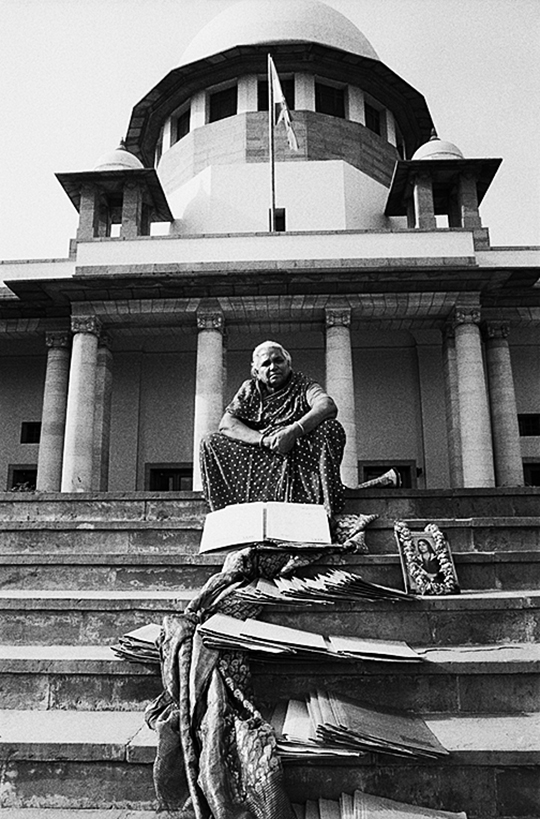With the demise of Satyarani Chadha, Indian women’s movement loses a stalwart warrior
By Juhi Jain
Satyarani Chadha, a stalwart of the 1980s anti-dowry movement in Delhi, a founder member ( along with Shahjehan Aapa) of ShaktiShalini, a women’s organization cum shelter for girls and women survivors of dowry and domestic violence, passed away this week. In her late 80s Satyaraniji was battling cancer and dementia for the last few years.
I met Satyaraniji (or Mataji as she was known to many) for the first time in the 80s at a meeting to discuss the dowry death of a young 19 year old girl in a posh locality in South Delhi. The distraught parents of the deceased girl sat numb staring into space, the atmosphere was heavy and no one knew what to do as the police had refused to register a case of murder.
Satyarani Chadha immediately took the parents to the police station and ensured that the FIR was recorded. Her words, ‘rone se kaam nahi chalta (it does not help to cry) hume apni betiyon ke liye sirf insaaf chahiye, tumhe hamari madad karni hogi (we want nothing short of justice for our daughters, you will have to help us)’ to the station officer resonated with a firm commitment to the cause for justice. The parents left the police station feeling confident and hopeful; young activists like me felt empowered and in control. This is how we have known Satyarani Chadha- strong, confident and ready to help. But she was not always like this.
Satyarani Chadha did not have the benefit of either vernacular or English education, nor the privileges of an elite class. She was a shy, middle class family woman until the tragic death of her 20 year old, six month pregnant daughter Kanchanbala, with 100% burns in her marital home. This event in 1979, 35 years ago changed her into an activist and a relentless crusader for women’s rights and justice. Along with the parents of over 20 dowry victims, she spent 27 years of stubborn pursuit and dogged determination, battling legal cases and visiting courts, till she finally got justice when the High Court upheld the conviction of her son-in-law for abetting Kanchanbala’s suicide.
Turning her grief into courage and deriving strength from her personal trauma Satyarani embarked on a life long struggle through her organization ShaktiShalini for women survivors facing domestic violence, dowry abuse and harassment in their marital homes. She spent many years guiding, counseling and supporting parents and girls facing harassment and violence at the hands of their husbands and in-laws for dowry.

Sathyarani Chadha, staged portrait at Supreme Court, Delhi, 1991 (from Seven lives & a Dream) photo by Sheba Chhachhi
The image of Satyarani holding her daughters graduation photograph and sitting on the steps of the Supreme Court became synonomous with the anti dowry protests in the country. These were instrumental in bringing about two vital amendments to the anti dowry law of the nation, thus strengthening the rights of women and girls.
The first amendment, made in 1983, changed the definition of dowry in the law to include any demand for gifts at any time during the marriage. The second amendment was brought about in Section 113 A of the Indian Evidence Act (of 1986), according to which an abetment to suicide was presumed if a married woman killed herself within seven years of marriage and if her husband/in-laws had subjected her to any form of violence and cruelty.
I lost my daughter 35 years ago but in that process I saved thousands and thousands of others. But in the end, what did I get? He is alive, married and absconding, he is not in prison, but my daughter is dead. This disillusionment with law will always stay with me
But the victory in her daughter’s case and the reforms in the law were of little comfort for Satyarani Chadha. She said, “I lost my daughter 35 years ago but in that process I saved thousands and thousands of others. But in the end, what did I get? He is alive, married and absconding, he is not in prison,” she said of her son-in-law, “but my daughter is dead. This disillusionment with law will always stay with me.”
The Indian women’s movement will always remember Satyarani Chadha as a woman of grit and courage, with an undying perseverance and a staunch commitment to fight the social menace of dowry and violence in marital homes. She continued till the very end, a persistent struggle for women’s dignity, demanding from the government land on which shelters and homes for girls and women who were being harassed and subjected to violence in their marital homes could be built.
Satyaraniji, we salute and celebrate you, with fondness and admiration; we will undoubtedly miss your comforting presence but you will always dwell in our hearts inspiring, guiding and motivating us. At a time when the laws she helped strengthen are coming under adverse scrutiny by the Supreme Court with the judgment on no automatic arrests following 498A complaints, she will be more sorely missed. We must pledge to continue her struggle as it is not over still.
Featured photo: Satyarani Chadha, Anti- Dowry protest, Delhi 1981 by Sheba Chhachhi